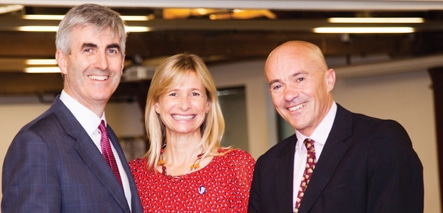I am writing this having just returned from our first conference as AIS FPDC, which was held at the Manchester Museum of Science and Industry and attended by nearly 100 delegates. It really was encouraging to see so many members in one place. There was a general air of optimism and a buzz that has been lacking over the past few years. That alone was enough to put a smile on our faces.
 With the construction output forecast to grow by nearly five per cent per annum over the next two years, the outlook for the fit-out and finishes sector looks buoyant.
With the construction output forecast to grow by nearly five per cent per annum over the next two years, the outlook for the fit-out and finishes sector looks buoyant.
We heard encouraging forecasts about the economy and the market from Christian Spence from Greater Manchester Chamber of Commerce and Allan Wilén of Glenigan.
However, whilst it is clear things are on the up for members, increased workloads bring some of those issues that were less evident during the recession to the fore. None greater than that of skills and training.
I attended the launch of the Built Environment 2050 report produced by the BIM2050 group of young construction professionals a couple of weeks ago. The report reflects the views of these young people who will be running the industry when most of us have long retired.
Richard Threlfall, head of infrastructure at KPMG, considered that ‘skills is the issue facing the industry’. Indeed we are already seeing upward pressure on labour rates and capacity problems as contractors approach or have secured full order books. Truly this is an industry of feast or famine.
In recognition of the importance of this issue, AIS FPDC has placed skills at the top of its agenda, and made it a key focus point of the Association’s new strategy. We are working closely with CITB to help steer reform and get a better deal for our members.
With this in mind, we welcomed the new chief executive of CITB Adrian Belton to our conference. He set out the plan for wholesale reform of CITB, involving changes to structure, levy, its approach to providing services (which he described as crazy – having to employ people to explain the products they currently supply as it was all too complicated) and a more collaborative approach to its operations. This is all of course long overdue but nonetheless very welcome.
Acknowledging the criticisms of CITB, he concluded by asking members to email him with their thoughts, good or bad. A brave man one could say!
It was clear from the conference that as well as skills and training, members want us to continue to address issues that help them improve their businesses. Cashflow, onerous contracts and lengthy PQQs in particular remain a problem. Christian Spence felt that poor cashflow was hampering growth and capacity in the industry. AIS FPDC will continue to offer support services to members, be them legal and commercial, HR or marketing.
The third key issue to be addressed is that of technical standards. The association will develop more best practice guides to show clients what good looks like and participate in standards setting with BSI. The impartial advice service is being used increasingly for the resolution of technical disputes. This is often by clients who want that independent view of an install. But also members who want to resolve a stalemate.
The conference once again showed the strength of the AIS FPDC. Contractors, manufacturers and suppliers networking over a beer at the end of the day.The ability to bring groups from across the industry together to deal with a specific challenge is pretty unique and in areas such as BIM development this allows us to help set the agenda to the advantage of all members.
Finally a piece of significant news – we will be changing the name and rebranding in the New Year. It is important that we project the face of the new association and AIS FPDC was never designed to be anything other than an interim solution. As ever your suggestions are very welcome.
David Frise
AIS FPDC chief executive


